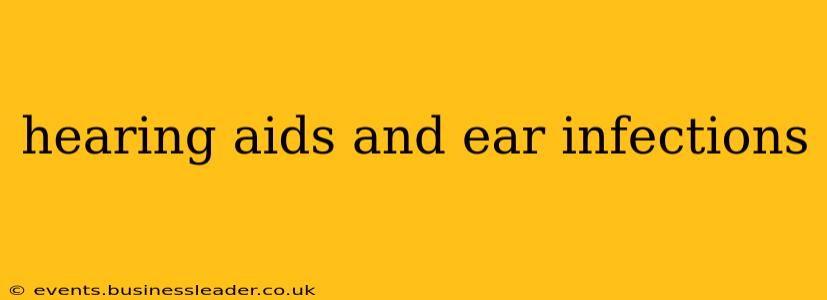Hearing aids are invaluable for millions experiencing hearing loss, improving communication and quality of life. However, a common concern revolves around the potential link between hearing aids and ear infections. This comprehensive guide will delve into this relationship, addressing common questions and offering practical advice for maintaining ear health while using hearing aids.
Can Hearing Aids Cause Ear Infections?
While hearing aids themselves don't directly cause ear infections, they can create an environment that is more conducive to their development. The presence of a foreign object in the ear canal can, if not properly cared for, increase the risk of infection. Moisture trapped between the hearing aid and the ear canal provides an ideal breeding ground for bacteria and fungi. This is particularly true for those already prone to ear infections or with underlying conditions like eczema or diabetes.
What are the Signs of an Ear Infection with a Hearing Aid?
Recognizing the symptoms of an ear infection is crucial for prompt treatment. These can include:
- Pain or discomfort in the ear: This is often the most noticeable symptom.
- Redness or swelling in the ear canal: Visible upon inspection.
- Discharge or drainage from the ear: This may be clear, yellow, or green in color.
- Feeling of fullness or pressure in the ear: A sensation of blockage.
- Hearing changes: A worsening of hearing loss, beyond the typical effects of the hearing impairment itself.
- Fever: This is more common in severe infections.
- Itching in the ear: While not always present, this is another possible indication.
How Can I Prevent Ear Infections While Using Hearing Aids?
Preventing ear infections while using hearing aids involves proactive care and hygiene. Here are some key strategies:
- Regular cleaning: Clean your hearing aids daily with the recommended cleaning tools and solutions provided by your audiologist. This removes wax buildup, debris, and moisture.
- Proper handling: Always wash your hands before handling your hearing aids.
- Drying: Use a hearing aid drying kit or desiccant to remove moisture.
- Inspect your ears: Regularly examine your ears for any signs of redness, swelling, or discharge.
- Professional checkups: Attend regular appointments with your audiologist for professional cleaning and assessments.
- Avoid swimming: If you must swim, use waterproof earplugs or consider using a waterproof hearing aid casing.
- Manage existing conditions: If you have eczema or diabetes, diligently manage these conditions to minimize your risk of infection.
Are Certain Types of Hearing Aids More Prone to Causing Ear Infections?
The type of hearing aid doesn't inherently increase the risk of infection. However, some designs might present slightly different challenges. For example, in-the-canal (ITC) and completely-in-canal (CIC) hearing aids sit deeper in the ear canal and may be more challenging to clean thoroughly, potentially increasing the risk of moisture buildup. Proper cleaning remains paramount regardless of the hearing aid style.
How are Ear Infections Treated When Using Hearing Aids?
Treatment for an ear infection typically involves antibiotics prescribed by a doctor or other qualified healthcare professional. During treatment, it's usually advisable to remove the hearing aids to allow the ear to heal properly and prevent further irritation. Your healthcare provider will advise on the appropriate duration of hearing aid removal and when it is safe to resume their use.
What Should I Do If I Suspect an Ear Infection While Using a Hearing Aid?
If you suspect an ear infection, remove your hearing aid and consult a doctor or your audiologist immediately. Early diagnosis and treatment are crucial to prevent complications. Do not attempt to self-treat.
Conclusion:
Hearing aids offer significant benefits to individuals with hearing loss. While they don't directly cause ear infections, proper hygiene and regular maintenance are vital to minimizing the risk. By following these guidelines and promptly addressing any signs of infection, you can enjoy the benefits of your hearing aids while safeguarding your ear health. Remember, proactive care is key to preventing problems and maintaining a healthy ear environment.
